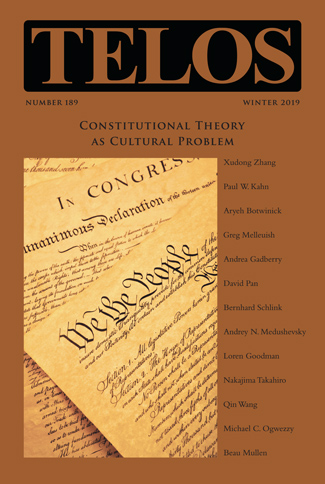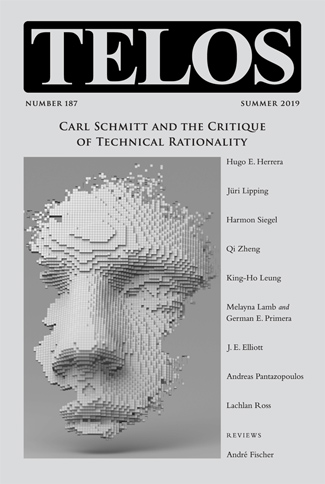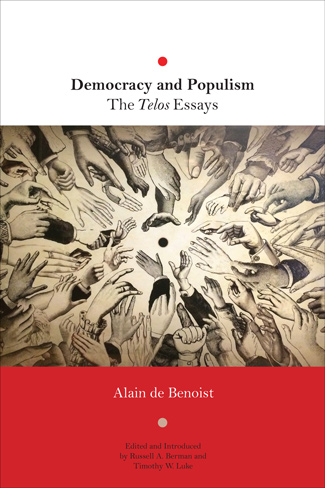By Xudong Zhang and David Pan · Monday, December 16, 2019 Telos 189 (Winter 2019), a special issue on Constitutional Theory as Cultural Problem, edited by Xudong Zhang and David Pan, is now available for purchase in our store. Individual subscriptions to Telos are also available in both print and online formats.
 The challenges faced by the liberal democratic model of government in the twenty-first century have made constitutional theory into an urgent topic of global concern. Both the second Iraq war and the revolutions of the Arab Spring frustrated hopes of an easy global trajectory toward liberal democracy. If there was the hope that liberation would mean the establishment of liberal constitutional norms, the result has been that emancipation from tyranny does not naturally lead in a particular political direction. Meanwhile, established liberal democracies, from the United States to Europe to India, are facing upheavals that have prompted many to question the stability of the model itself, leading to the need to revise a constitutional theory that up to now has been built around the liberal democratic model. While the constitutional state, as theory and practice in modern Europe, North America, and Asia, continues to be the common point of reference, its stability and legitimacy can no longer be taken for granted, thus requiring renewed thinking about its history and cultural foundations. The challenges faced by the liberal democratic model of government in the twenty-first century have made constitutional theory into an urgent topic of global concern. Both the second Iraq war and the revolutions of the Arab Spring frustrated hopes of an easy global trajectory toward liberal democracy. If there was the hope that liberation would mean the establishment of liberal constitutional norms, the result has been that emancipation from tyranny does not naturally lead in a particular political direction. Meanwhile, established liberal democracies, from the United States to Europe to India, are facing upheavals that have prompted many to question the stability of the model itself, leading to the need to revise a constitutional theory that up to now has been built around the liberal democratic model. While the constitutional state, as theory and practice in modern Europe, North America, and Asia, continues to be the common point of reference, its stability and legitimacy can no longer be taken for granted, thus requiring renewed thinking about its history and cultural foundations.
Continue reading →
By Qi Zheng · Wednesday, July 24, 2019 Qi Zheng’s “Carl Schmitt, Justice of War, and Individual Citizen’s Obligation” appears in Telos 187 (Summer 2019). Read the full article at the Telos Online website, or purchase a print copy of the issue in our online store. Individual subscriptions to Telos are available in both print and online formats.
 Carl Schmitt produced the original text of “The International Crime of the War of Aggression and the Principle ‘Nullum crimen, nulla poena sine lege‘” in 1945. The fundamental issue of the text concerns an individual citizen’s obligation in international law toward his national government in the event of an unjust war. Schmitt’s analysis of the issue is based on his perception of politics as the relationship between protection and obedience. However, his understanding of this relationship is not consistent with what he proposed in his other major works, i.e., that the relationship is a collective one. In order to support the argument in his 1945 text, Schmitt completely abandoned his collective understanding of the relationship and changed it to an individualistic understanding. This paper explores the subtle but important change in Schmitt’s argument. Carl Schmitt produced the original text of “The International Crime of the War of Aggression and the Principle ‘Nullum crimen, nulla poena sine lege‘” in 1945. The fundamental issue of the text concerns an individual citizen’s obligation in international law toward his national government in the event of an unjust war. Schmitt’s analysis of the issue is based on his perception of politics as the relationship between protection and obedience. However, his understanding of this relationship is not consistent with what he proposed in his other major works, i.e., that the relationship is a collective one. In order to support the argument in his 1945 text, Schmitt completely abandoned his collective understanding of the relationship and changed it to an individualistic understanding. This paper explores the subtle but important change in Schmitt’s argument.
This paper is divided into two sections. The first section reconstructs Schmitt’s arguments on an individual citizen’s right to resistance in international law. It focuses on two questions: whether an individual citizen has the right to judge the justice of war and whether individuals have an obligation in international law to disobey the government if they find that their government is conducting an unjust war. The second section examines Schmitt’s argument about the relationship between protection and obedience.
Continue reading →
By David Pan · Monday, June 17, 2019 Telos 187 (Summer 2019) is now available for purchase in our store. Individual subscriptions to Telos are also available in both print and online formats.
 After a modern era of technological progress that has led humans to believe in their increasing ability to control nature, we are reaching a point at which this power on a small scale has given way to increasing uncertainty and uncontrollability on the large scale. Not only are the specific effects of climate change difficult to predict and control, the only mechanisms available for such control—agreement and cooperation across national and cultural divides—are not the stuff of engineering but of politics. So with every technological advance that promises to bring us more control over our lives, we as a species are facing ever greater risks and uncertainties. The question concerning technology has become the unpredictability and uncontrollability of its development itself. The key difficulty is a problem of a tension between community or national interests and species-wide interests. While there might be an ethical imperative on a species-wide level to exercise self-restraint in pursuing dangerous technologies such as nuclear weapons, gene manipulation, or coal-fired power plants, such self-restraint could very well lead to the decline or even annihilation of the group that exercises it. The path forward will not be revealed by new technological advances, which can easily create more problems than they solve, but through the development of new ethical, political, and affective frameworks by which people understand themselves and their connections to the rest of the world. This issue of Telos, devoted to Carl Schmitt and the critique of technical rationality, investigates the ways in which Schmitt’s critique moved him toward ways of considering law, politics, and human history as fundamentally uncertain movements, requiring strategies that accept such unpredictability even as we try to intervene in our historical development as a species. After a modern era of technological progress that has led humans to believe in their increasing ability to control nature, we are reaching a point at which this power on a small scale has given way to increasing uncertainty and uncontrollability on the large scale. Not only are the specific effects of climate change difficult to predict and control, the only mechanisms available for such control—agreement and cooperation across national and cultural divides—are not the stuff of engineering but of politics. So with every technological advance that promises to bring us more control over our lives, we as a species are facing ever greater risks and uncertainties. The question concerning technology has become the unpredictability and uncontrollability of its development itself. The key difficulty is a problem of a tension between community or national interests and species-wide interests. While there might be an ethical imperative on a species-wide level to exercise self-restraint in pursuing dangerous technologies such as nuclear weapons, gene manipulation, or coal-fired power plants, such self-restraint could very well lead to the decline or even annihilation of the group that exercises it. The path forward will not be revealed by new technological advances, which can easily create more problems than they solve, but through the development of new ethical, political, and affective frameworks by which people understand themselves and their connections to the rest of the world. This issue of Telos, devoted to Carl Schmitt and the critique of technical rationality, investigates the ways in which Schmitt’s critique moved him toward ways of considering law, politics, and human history as fundamentally uncertain movements, requiring strategies that accept such unpredictability even as we try to intervene in our historical development as a species.
Continue reading →
By Telos Press · Saturday, September 1, 2018 New from Telos Press: Democracy and Populism: The Telos Essays, by Alain de Benoist. Edited by Russell A. Berman and Timothy W. Luke. Order your copy in our online store, and save 20% on the list price by using the coupon code BOOKS20 during the checkout process.
 The crisis of democracy, the consequences of neoliberalism and globalization, the limits of sovereignty, and of course the rise of populism: few thinkers have given more sustained attention to these matters than the French author Alain de Benoist. Democracy and Populism collects de Benoist’s essays from the journal Telos, where many of his writings first appeared in English translation. Reading de Benoist in Telos provides access to a distinctive transatlantic intellectual dialogue and to an array of prescient insights into the current political condition on both continents. De Benoist clearly anticipated today’s political condition: the critique of neoliberalism, the contradictions in liberalism created by the postcolonial frictions of identity politics, and the implications of a resurgent populism. The specific forms of populist movements are sure to vary in the coming years, but the crisis of liberal democracy will remain the defining feature of political life for the foreseeable future. De Benoist explains why. The crisis of democracy, the consequences of neoliberalism and globalization, the limits of sovereignty, and of course the rise of populism: few thinkers have given more sustained attention to these matters than the French author Alain de Benoist. Democracy and Populism collects de Benoist’s essays from the journal Telos, where many of his writings first appeared in English translation. Reading de Benoist in Telos provides access to a distinctive transatlantic intellectual dialogue and to an array of prescient insights into the current political condition on both continents. De Benoist clearly anticipated today’s political condition: the critique of neoliberalism, the contradictions in liberalism created by the postcolonial frictions of identity politics, and the implications of a resurgent populism. The specific forms of populist movements are sure to vary in the coming years, but the crisis of liberal democracy will remain the defining feature of political life for the foreseeable future. De Benoist explains why.
Continue reading →
By Jack Robert Edmunds-Coopey · Tuesday, April 3, 2018 As an occasional feature on TELOSscope, we highlight a past Telos article whose critical insights continue to illuminate our thinking and challenge our assumptions. Today, Jack Robert Edmunds-Coopey looks at Jeffrey Bussolini’s “Ongoing Founding Events in Carl Schmitt and Giorgio Agamben” from Telos 157 (Winter 2011).
Jeffrey Bussolini’s article “Ongoing Founding Events in Carl Schmitt and Giorgio Agamben” is a discursive piece seeking to provide groundwork on the conception of the event and its theological and political dimensions. He coins this term “ongoing founding events” as a type of poetic gesture toward the movement of temporality to which events are founded, and which as a consequence of their founding then continue to contaminate the space around them. Bussolini claims that for Schmitt the event of decision generates sovereignty, and that within this basic movement, whether it be mythical or concrete reality at this point is unsure, becomes the generating and maintaining of political order.
Continue reading →
By Aaron Zack · Thursday, January 18, 2018 Aaron Zack’s “Sovereignty and Grand Strategy: Some Observations on the Rise of China and Decline of the Americans” appears in Telos 181 (Winter 2017). Read the full article at the Telos Online website, or purchase a print copy of the issue in our online store. Individual subscriptions to Telos are now available in both print and online formats.
The rise and decline of great powers are not solely material in nature but also moral, political, and cultural. Many modern theorists emphasize the material factors in rise and decline, but older political thinkers focused on moral-political explanations. Carl Schmitt defines the essence of the political as the distinction between friend and enemy. A rising sovereign will effectively distinguish between friends and enemies and act in the interest of a political community. A decaying sovereign will gradually lose its capacity to both make a rational distinction between friends and enemies and act in the interest of the (fading) political community. True grand strategy therefore depends upon a robust sovereign—a decayed sovereign faces difficulty in implementing an effective or optimal grand strategy.
Continue reading →
|
|
 The challenges faced by the liberal democratic model of government in the twenty-first century have made constitutional theory into an urgent topic of global concern. Both the second Iraq war and the revolutions of the Arab Spring frustrated hopes of an easy global trajectory toward liberal democracy. If there was the hope that liberation would mean the establishment of liberal constitutional norms, the result has been that emancipation from tyranny does not naturally lead in a particular political direction. Meanwhile, established liberal democracies, from the United States to Europe to India, are facing upheavals that have prompted many to question the stability of the model itself, leading to the need to revise a constitutional theory that up to now has been built around the liberal democratic model. While the constitutional state, as theory and practice in modern Europe, North America, and Asia, continues to be the common point of reference, its stability and legitimacy can no longer be taken for granted, thus requiring renewed thinking about its history and cultural foundations.
The challenges faced by the liberal democratic model of government in the twenty-first century have made constitutional theory into an urgent topic of global concern. Both the second Iraq war and the revolutions of the Arab Spring frustrated hopes of an easy global trajectory toward liberal democracy. If there was the hope that liberation would mean the establishment of liberal constitutional norms, the result has been that emancipation from tyranny does not naturally lead in a particular political direction. Meanwhile, established liberal democracies, from the United States to Europe to India, are facing upheavals that have prompted many to question the stability of the model itself, leading to the need to revise a constitutional theory that up to now has been built around the liberal democratic model. While the constitutional state, as theory and practice in modern Europe, North America, and Asia, continues to be the common point of reference, its stability and legitimacy can no longer be taken for granted, thus requiring renewed thinking about its history and cultural foundations. 



